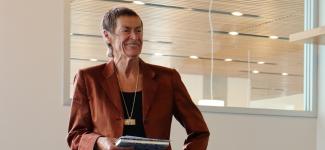
Professor Leonie Sandercock:
"Community planning is the work of building connections. It is the work of healing, repair, renewal."
This June, SCARP Professor Leonie Sandercock published her extraordinary new book, “Mapping Possibility: Finding Purpose and Hope in Community Planning”. Like her previous works, it unravels the field of community and regional planning from a critical framework, but it also invites us into an intimate journey to process for ourselves what she’s taught all along.
Community and regional planning has, for some time now, been a field undergoing a transformative reckoning. Planning, once a tool of stratification along hierarchies, is now slowly and imperfectly reasserting itself as a matrix of partnerships, stretching outward not in expansion but in invitation to share healing congress and rebuild together, with consent and respect.
Leonie redefined the field in more progressive, culturally fluent directions, and it's never going back. Dr. Libby Porter, Professor in Urban Policy at RMIT University, Melbourne, calls Leonie "one of community planning's leading thinkers". Her remarkable career spanned nearly half a century as an educator, researcher, and artist. Leonie's dedication and gift to us was her pursuit of social, cultural, and environmental justice.
In large part, Leonie shares this wisdom not as something she owns or has created, but as “the dance of the spiraling generations”, a mentorship through the ages, as though those who came before us are still in partnership with us. Sandercock contextualises, crucially, that this mentorship is not unidirectional, and there are gifts of wisdom each new generation gives us.
With this framework, this story, of who we are and why we exist, we can think of no better description of what SCARP is; what we promise to always be.
There is no objective voice with which to tell any history, and attempts to tell any amount of Leonie’s story will be a series of choices from a certain lens. The best choice, then, is to show these voices, who have joined Leonie through her life and have described their experiences with her through their own lenses. What Leonie calls the classic ‘authoritative academic voice’ of alleged omniscience, which she consciously and proudly unlearnt throughout her early career, fades away into individuals, each gifted a part in Leonie’s story. In this spirit, the ‘SCARP collective voice’ also fades away: speaking now has been Kyle Mallinson, who writes for SCARP and its people sometimes, and I’ve known Leonie Sandercock for a disappointingly short time. And so, while I already could go on and on about Leonie, I defer now to them:
In celebration of launching Mapping Possibilities, some dear colleagues and keen minds gathered and spoke on the future of planning as well as what Leonie has contributed to the field, up to and including this latest work. It goes without saying that people’s spirits came alive in the presence of each other in the space Leonie created.
This book launch took place on the eve of Professor Sandercock’s retirement from teaching, which caused all who gathered to reflect on a triumphant career and the gift of her life’s work.
When speaking at her recent book Launch, Leonie contextualised why exactly the poster for the event was her walking out to sea with a surfboard. She had repeatedly been asked the question of what her next great project is, what’s next for her. The image of her walking out to the peace, bliss, and adventure she finds atop a wave at sea is her great and ultimate answer to this question.